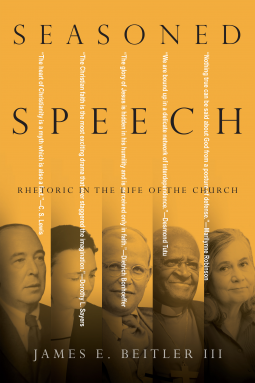
James E. Beitler III is an associate professor of English at Wheaton College, so it isn’t surprising that he should write a book on rhetoric, or persuasive speaking. Beitler looks at rhetoric in the church as he examines five prominent Christian thinkers and writers of the last hundred years (C.S. Lewis, Dorothy Sayers, Dietrich Bonhoeffer, Desmond Tutu, Marilynne Robinson, plus worship). Beitler matches each of those thinkers with a season of the church calendar from Advent to Pentecost.
The title of Seasoned Speech was likely inspired by Colossians 4:6 English Standard Version: Let your speech always be gracious, seasoned with salt, so that you may know how you ought to answer each person.
Seasoned Speech is replete with footnotes and content notes, the notes sometimes taking up more space than the text which the note is referencing.
Beitler spends a great deal of time in the beginning of the book defining rhetoric, and discussing how he is using it in this book. In society today, and especially in the news media, rhetoric has taken on a decidedly negative connotation. Beitler uses it in a positive sense, as persuasive speech that may cause one to choose to become a Christian.
My personal favorite master of rhetoric examined in Seasoned Speech is Desmond Tutu. He boldly proclaimed his faith at a place and time when racial tensions put his life in jeopardy. His words were persuasive and his personality charismatic. In a church where armed soldiers lined the walls, Tutu was able to rouse the frightened congregants into a worshiping, dancing crowd that made the soldiers feel no threat.
Beitler believes rhetoric is rarely used in the church, and if it is used at all it is by the clergy. He hopes that will change. Rather than the lay-person using a simplified formula and failing at witnessing, Beitler would like to see all Christians trained in the use of rhetoric; for aren’t all Christians called to witness?
#SeasonedSpeech #NetGalley @ivpress @ivpacademic @WheatonCollege @WheatonExperts

